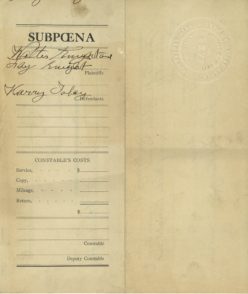

Issuing third-party subpoenas is a routine part of any litigator’s practice. The process is fairly straightforward when the third party is a resident of the same state where your action was filed, but getting records from an out-of-state records custodian can be more complex.
Recent amendments to Rule 45 of the Federal Rules of Civil Procedure streamlined the process of issuing subpoenas for information from another state. The old rule required an attorney to issue a subpoena from the court where the records custodian would comply with the subpoena, regardless of the venue of the underlying litigation.
Under the amended rule, subpoenas issue from the court where the lawsuit is pending, known as the “issuing court.” The court where the nonparty complies with the subpoena is now called the “compliance court.”
A nonparty that objects to compliance with the subpoena files its motion to quash, motion for protective order or other motions related to the subpoena with the compliance court. The amended rule authorizes the compliance court to transfer these motions to the issuing court for resolution. The compliance court then enforces the issuing court’s order.
Generally speaking, a resident of one state is not required to appear for deposition in another state or to provide records in compliance with a records subpoena issued in another state. A litigant must request the assistance of a nonparty’s state court to issue a subpoena from that jurisdiction. Each state has its own procedure for issuing a subpoena in an out-of-state case.
For example, California Code no. 2029.300(a) spells out the process for compelling testimony from a nonparty in California in a case filed in, say, Nevada. The Nevada litigant submits a Nevada subpoena to the California superior court where discovery will be conducted. The Nevadan files a request that the California court issue a subpoena that incorporates the terms of the Nevada subpoena.
Once issued, the California subpoena is then served on the nonparty. If the nonparty fails to comply with the subpoena, compliance may be enforced by the California court that issued it.
A litigant may depose a corporation by serving a subpoena issued by the court where the corporation is domiciled. A corporation’s domicile may be the state where its principal offices are located or the state where it organized as a corporate entity, if that state is different than the site of its headquarters. When a corporation is domiciled in two states, a subpoena issued in either of the two states will bind the corporation.
An attorney who needs to compel an out-of-state witness to testify in a criminal case need not follow the procedure established for civil cases. All fifty states have adopted the Uniform Act to Secure the Attendance of Witnesses from Without a State in Criminal Proceedings. The Uniform Act gives a state the authority to compel its residents to testify in a criminal matter being adjudicated in another state, This uniform law was enacted to help ensure a criminal defendant’s right to a fair trial.